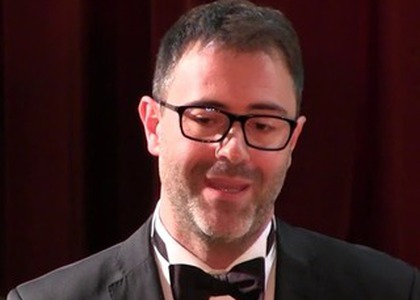> [Archived] Interviews

Interview with pianist Ștefan Doniga
Between October 24th and November 9th, the pianist Ștefan Doniga and violinist Diana Jipa will perform a national tour entitled "Porumbescu's Legacy". More details from Ștefan Doniga.
Mr. Ștefan Doniga, after touring the world with violinist Diana Jipa, here you are back on the road again, this time in the country. It is a tour entitled Porumbescu's Legacy, part of the Romania Universalis series, 5th edition. What made you decide to focus on the personality of Ciprian Porumbescu and why did you think that such an approach was necessary for the Romanian cultural space?
The year 2023 is above all extremely generous for Romanian culture and this is in fact a proof of how rich our culture is, because we are not only celebrating Dimitrie Cantemir, the one with whose name we set off around the world, but also in 2023, here are 170 years since the birth and 140 since the death of Ciprian Porumbescu and there are still many important dates in this year, it is also Ion Voicu's centenary as we all know. So, as it is, as one of the fundamental personalities of Romanian music, this eternal young composer left a very important mark on our music and on the music of South-East Europe, I would say, especially after that troubled period, after 1848. So we cannot neglect the personality of CiprianPorumbescu.This is why we built this project. It is also a project with funding obtained through a competition. It is supported by the General Secretariat of the Government, so a new challenge for us to win projects to promote Romanian culture.
I would like you to tell us about the programme you will present in the ten recitals. What is the red thread that connects the works you will perform with violinist Diana Jipa?
Together with Diana, we have built a programme to show Porumbescu's legacy, in fact that's the name of the project, Porumbescu's Legacy Romania Universalis. We started from this absolutely unmistakable lyrical vein that he left in Romanian music and which seems to be a characteristic of our music. We looked for this lyricism in all the music after CiprianPorumbescu and we started with illustrious names, with George Enescu, with DinuLipatti as composer and then passing through the great names of our music, Paul Constantinescu, Theodor Rogalski, all authors of ballads and elegies. We have built this project only in this area, as I said, of lyrical expression. The entire programme is made up of Romanian folk songs, ballads and elegies and we also use this opportunity of our tour and our programme to show our gratitude to our great composers whom we have had the privilege to know and who, for some time or less, have not been with us. Because in the programme's recital there are works by Felicia Donceanu and Carmen Petra-Basacopol who accompanied us on our tour around the world and we proudly announced to the public that we knew MrsBasacopol and that she was still playing alongside us, but only a few days after we returned from the tour we found out with sadness that she had left us. So this tour and this programme is also dedicated to the memory of her.
Let us now turn our attention to tomorrow's event, October 26th, at the Oradea Philharmonic, where you will perform the Concerto No. 3 for piano and orchestra by Sergei Bortkiewicz. How would you describe this opus and what significance does this composer's work have for you?
This opposite is, I think, best described by the subtitle that Sergei Bortkiewicz himself gave it, Per aspera ad astra - Through suffering to light. It is a fabulous sound picture, unheard of in music, I would say. It is a privilege for me to have made a world premiere print of this work and, it turns out, to have played its world premiere in 2014 at the Timișoara Philharmonic. The work is a symphonic poem with piano. It is a monumental work and extraordinarily modern music at the same time. It's sort of a combination of, I would say, Sergei Rahmaninov and John Williams. It's something that you hardly find in music, and it's obviously become a work of the heart. All the more so because it is also a very important symbolic moment, today, October 25th is the day Sergei Bortkiewicz died in 1952, so today is the 71st anniversary of his death and I am celebrating with tomorrow's concert the memory of this great Ukrainian composer who, by the drama of his existence and by the drama of his music, has gone before history and speaks a lot about tragic destinies that are still valid today unfortunately.
Translated by Andreea Iulia Ciucă,
University of Bucharest, Faculty of Foreign Languages and Literatures, MTTLC, year II
Corrected by Silvia Petrescu














